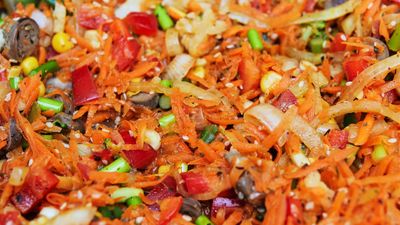As the summer harvests yield bountiful amounts of zucchini, squash, cucumbers and tomatoes, it's tempting to take on a pickling hobby. However, to properly pickle foods, you need a pickling liquid made of vinegar or brine and, in both cases, lots of salt for preservation and flavor.
Since many of us are advised to eat less sodium for a heart-healthy diet, you might be wondering: Are pickles good for you or salt shockers? Registered dietitians share what you need to know about the pros and cons of pickled foods and how to enjoy them.
THE BENEFITS OF PICKLED FOODS
"Pickles are low in calories, fat-free and also impart some nutrients from the whole foods they're made with," says Tamar Samuels, RD. For example, pickled cucumbers are a good source of vitamin K, a key micronutrient for blood clotting and bone health, and kimchi (aka Korean-style pickled cabbage) is also a great source of vitamins C and K, folate and riboflavin.
Pickled foods fermented in a salty solution for several weeks like traditional dill pickles or sauerkraut are also an excellent source of probiotics. These "good" bacteria help support a healthy gut and immune system and are even linked to weight loss and cognitive health.
Moreover, for endurance athletes, the sodium could be helpful as some small studies show it can help reduce muscle cramps.
THE ISSUE OF SODIUM
One big downside to eating pickled foods is they tend to be high in sodium, says Samantha Cochrane, a registered dietician at the Ohio State University Wexner Medical Center. One medium sour pickle contains 786 milligrams of sodium — nearly 1/3 of the daily recommended sodium intake for most adults (no more than 2,300 milligrams), per the American Heart Association. As such, if you have a chronic health condition like high blood pressure, heart disease or kidney disease, or you're at risk for developing stomach cancer, your doctor may suggest you reduce or avoid high-sodium foods including pickles.
Another con is pickled foods can cause bloating due to the high-sodium content, which encourages water retention. If you're sensitive to pickled foods or need to watch your sodium content, you can always cut back on portion size and watch your overall sodium intake for the day by tracking it in an app like MyFitnessPal.
HOW TO PREP AND EAT PICKLED FOODS
Pickling freshly harvested fruits and vegetables is a great way to add flavor, crunch and variety to your plate. "The most important thing to consider when pickling foods at home is food safety," says Cochrane. To avoid foodborne illness, follow recipes exactly and use proper canning practices to prevent the potential growth of harmful bacteria.
For quick pickles, which are ready to eat as soon as they've chilled, bring a mixture of equal parts vinegar and water with salt and spices (like garlic cloves and whole peppercorns for a nice kick) to a boil, pour the mixture over your veggies and refrigerate them in a tightly-covered container like a Mason jar, says Samuels. Then, make sure to eat them within two weeks, per the Center for Food Safety. If you're interested in making fermented pickles, follow this guide.
THE BOTTOM LINE
"As long as your diet doesn't bar high-sodium foods, it is possible to enjoy pickled foods in moderation as part of a balanced diet," says Cochrane. To keep portion sizes in check, try them as a snack, side or condiment to spice up healthy meals. Try chicken tacos with pickled onions, banh mi sandwiches with pickled carrots, a stir-fry with kimchi, or the classic: a burger with a whole-grain bun and pickles.
